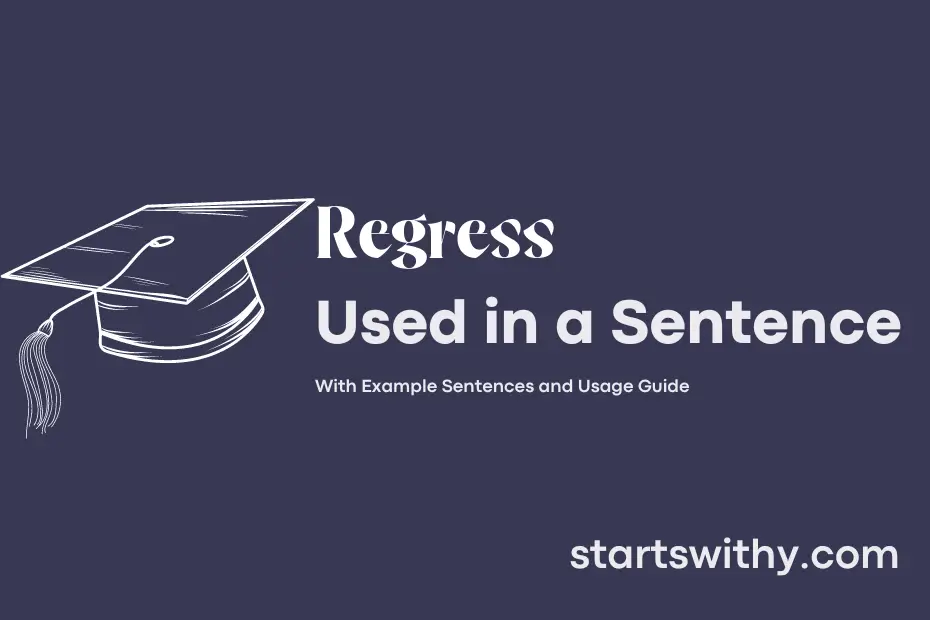Have you ever felt like your progress was moving backward instead of forward? This backward movement in your development or improvement is known as regress.
Regress is the act of reverting to a previous or less advanced state. It can occur in various aspects of life, such as personal growth, academic performance, or skill acquisition.
7 Examples Of Regress Used In a Sentence For Kids
- Let’s not *_regress_ in our learning, let’s keep moving forward!*
- We can always ask for help if we feel like we are about to regress in our studies.
- It’s okay to make mistakes, as long as we don’t regress when we learn from them.
- Remember to practice regularly so we don’t regress in our skills.
- We should always try our best so we don’t regress in our progress.
- If we work hard, we won’t regress but instead make great improvements!
- Let’s encourage each other to keep trying so we don’t regress in our efforts.
14 Sentences with Regress Examples
- If you don’t study regularly, your grades may regress over time.
- Lack of practice can cause your performance in exams to regress.
- It’s important to stay focused on your goals and not regress in your academic progress.
- Skipping classes can lead to a regress in your understanding of the subject.
- Procrastination can cause your productivity to regress.
- Watching too much TV instead of studying can make your academic performance regress.
- Avoiding seeking help when you are struggling can cause your learning to regress.
- Not revising your notes regularly may lead to a regress in your memory retention.
- Comparing yourself to others constantly can make you feel like you are regressing in your academic journey.
- Lack of time management can make your overall academic performance regress.
- Ignoring feedback from your professors may cause your improvement to regress.
- Letting distractions take over your study time can result in a regress in your grades.
- Not participating actively in class discussions may lead to a regress in your understanding of the subject.
- Giving up easily when faced with challenges can result in a regress in your problem-solving skills.
How To Use Regress in Sentences?
When Regress is used in a sentence, it means to return to a previous or less developed state. To use Regress effectively, follow these steps:
-
Identify the context: Understand the situation where Regress can be applied. It could be in a psychological, scientific, or social scenario where something is reverting back to an earlier stage.
-
Choose the correct form: Regress is a verb, so it should be used as an action word in a sentence. For example, “The patient began to regress after missing several therapy sessions.”
-
Check the tense: Make sure to use regress in the appropriate tense that fits the context of the sentence. For instance, “If he doesn’t practice regularly, his skills may start to regress.”
-
Provide context: Use additional words in the sentence to give more clarity to the meaning of regress, such as when, where, or why something is regressing. For example, “Without proper maintenance, the condition of the building started to regress rapidly.”
By following these steps, you can effectively use Regress in a sentence to convey the idea of reverting to a previous state. Remember to consider the context, form, tense, and provide additional context to ensure your sentence is clear and accurate.
Conclusion
In conclusion, the concept of regression in statistics refers to the relationship between variables where one variable predicts or influences another. This can be seen in decisions based on past outcomes, such as using regression to predict future sales based on previous data. For instance, a regression model can be used to analyze how changes in advertising spending affect product sales, helping businesses make more informed decisions.
Furthermore, regression can also be applied in psychological research to understand factors influencing behavior or in medical studies to predict disease progression. By analyzing patterns and trends in data through regression analysis, researchers and analysts can draw valuable insights and make predictions that can have important implications in various fields. Thus, regression plays a crucial role in decision-making processes and understanding relationships within complex systems.



